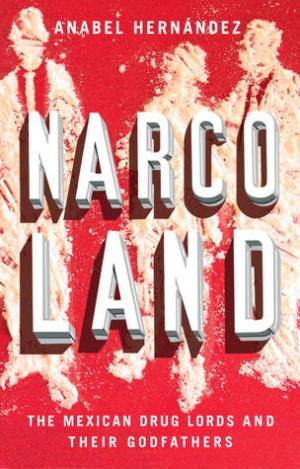Narcoland: The Mexican Drug Lords and Their Godfathers by Anibel Hernandez (2013, Verso Press, 362 pp., $26.95 HB)

But as just about anyone in Mexico will tell you, there is one Mexican drug trafficking organization whose top leadership appears untouchable. That would be the Sinaloa cartel, led by the world's most famous narco and one of its wealthiest men, Joaquin "El Chapo" Guzman, and his top henchman, Ismael "El Mayo" Zambada. More than a dozen years after he escaped from a Mexican prison, despite two presidencies waging an ever more aggressive war against the cartels, Guzman and company remain on top of the heap, his rivals decimated even as the Sinaloa cartel continues its bloody, multi-million dollar a year business. And El Chapo and El Mayo remain unscathed.
And as many, many Mexicans are eager to tell you, it looks like the fix is in. How is it that they can't catch or kill El Chapo? How is it that he escaped from prison in the first place? The cynical folk wisdom is that he is being protected by people in the government. That people should think that is not surprising. Suspicions of government complicity in the drug trade, whether in the state police forces; the ever-mutating (because frequently, necessarily, and unsuccessfully cleansed of corruption) federal police forces, the military, or the high ministries, are both long-held and well-founded.
Books reviewed in this publication over the past few years have amply detailed the layers of corruption and complicity surrounding the drug trade in Mexico, but in Narcoland, prize-winning Mexican journalist Anabel Hernandez takes it to a whole new level. Narcoland is the updated English language version of her explosive 2010 Mexican blockbuster Los Señores del Narco, a book whose publication generated death threats and led the National Commission on Human Rights to assign her two full-time bodyguards.
Despite Mexico's well-deserved reputation as a burial ground for journalists and despite the threats generated by her journalistic digging, Hernandez is undeterred. She is not the least bit squeamish about charging that the Mexican government has been hopelessly corrupted by the filthy lucre of the drug trade, right up to the presidential palace, and she is not afraid to name names, including people close to presidents Vicente Fox and Felipe Calderon, as well as some of their most important appointees, such as Calderon's Secretary for Public Safety Genaro Garcia Luna.
The charges Hernandez makes are blunt and mind-boggling: "From the beginning of his government, Calderon's strategy against the drug barons was designed to favor El Chapo Guzman and his main partners: El Mayo Zambada, El Nacho Coronel, and El Azul Esparragoza," she writes. "There is firm documentary evidence that Calderon's war was overwhelmingly aimed at those traffickers who are El Chapo's enemies or threats to his leadership… In fact, what Mexico has experienced in the last decade is not a 'war on drug traffickers,' but a war between drug traffickers, with the government taking sides for the Sinaloa Cartel."
Hernandez clearly finger Garcia Luna, Calderon's top cop, as deep in El Chapo's pocket, and presents pretty convincing evidence for her case, including not only the inability to ever find El Chapo, but also the deployment of Mexican state security forces on his behalf. Funny, isn't it, how the cartels the Mexican government most aggressively pursues are the ones that El Chapo happens to have in his sights at the time?
Hernandez is equally blunt in her assessment of Mexico as a whole. It's a "mafiocracy," she writes, and the criminality isn't limited to capos and cops. Politicians rely on drug money to win campaigns, and traffickers rely on bought politicians to go about their business. Similarly, businessmen and high society people turn a blind eye to the narco-wealth that insinuates itself into every corner of society and every sector of the economy.
Beyond being a mega-scale muckracker, Hernandez is also an excellent story teller. She provides a behind-the-scenes account of El Chapo's 2001 escape from Puente Grande prison that is both shocking and enthralling. I won't give it away, but suffice to say that the official version of events, in which El Chapo escaped in a laundry cart, is not, according to Hernandez, what really happened.
Likewise, while navigating one's way through that minefield of competing cartels and their nick-named major players is an excruciating task, Hernandez provides the clearest, most compelling, and most comprehensible narrative yet of the evolution and infighting among the cartels.
It feels like conspiracy theory, and at times, one has to wonder. Is Nacho Coronel really still alive, having, as Hernandez claims, having faked his death in a shoot-out with soldiers in Jalisco in 2010? It seems unlikely. But her broader thesis -- that the fix is in -- seems quite likely. Could Mexico's officially most wanted man have eluded capture or death, eliminated his rivals, consolidated his power, expanded his operations, and weaved his web of complicity without serious help from very well connected players at the highest levels of Mexican politics, business, and law enforcement? It seems unlikely.
This work by StoptheDrugWar.org is licensed under Creative Commons Attribution-ShareAlike 4.0 International
Comments
LAW AND ORDER WILL NOT BE TOLERATED
"LAW AND ORDER WILL NOT BE TOLLERATED" Chapo Guzman's reply, after the Mexican government declaired its war on drugs, by targeting his Cartel,. After this it Is enough to make anyone want to enter the Bandito business .This guy gets my vote..
Add new comment